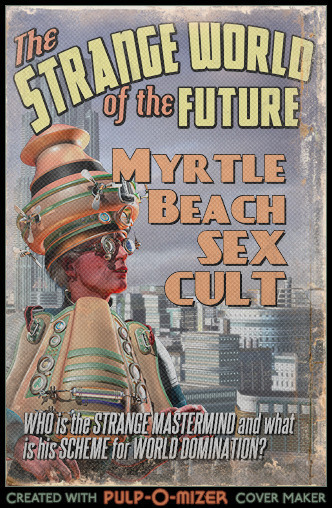Scott B. Pruden's Blog, page 15
April 2, 2013
One Amazon/Goodreads Combo, Comin’ Up
 So, Amazon – great, lumbering consumer juggernaut that it is – gobbled up literary social networking site Goodreads in (an impeccably timed) Good Friday announcement.
So, Amazon – great, lumbering consumer juggernaut that it is – gobbled up literary social networking site Goodreads in (an impeccably timed) Good Friday announcement.
If you’re interested in catching up, check out the New York Times‘ original story and this interesting bit of analysis on Amazon’s motivation from the Washington Post.
I saw the news but, consumed with pre-Easter prep and the celebrations of the weekend, put off posting until today. Not very New Media of me, but what the hell. Not much thoughtful analysis takes place by the bozos who insist on posting first.
But what struck me right off the bat when I heard of this move was, “Huh … Amazon, which already owns Shelfari, now feels it should own Goodreads, which was run by Barnes & Noble. Amazon makes Kindles, the most popular e-readers around, but couldn’t build itself a workable, popular literary networking site, while B&N, which produces the floundering Nook, had what was the most popular literary networking site around. Interesting how each could make one part of the puzzle work, but not the other.”
As I said, lots of other better informed folks have already chimed in on this, but I would like to point out that while ownership of the formerly pseudo-independent Goodreads by Amazon will likely put the recommendations portion of Goodreads under tighter control, it also puts two of the biggest arrows of the independent author/publisher arsenal into the same quiver.
Whether this will be good or bad for me and other indie authors remains to be seen. As both an author and a member of Codorus Press, I think my biggest concern is the danger of reader reviews somehow being deleted or diluted. As any author will tell you, one of the best ways to sell books – whether hard copies or e-books – is through word of mouth. And typically, that word of mouth these days comes thanks to online reviews from readers.
To take that major selling point from us kicks a leg out from beneath authors and small publishers who, shunned by big-box booksellers – of which B&N is the last – were standing on just one leg to begin with.
What Amazon should remember is that for many indies, Kindle Direct and the Amazon-owned print-on-demand service CreateSpace are the only places where some titles are available. For the company to keep Goodreads as intact and independent as possible would better serve Amazon by continuing to drive sales in what I would suspect are its two biggest growth sectors.


March 25, 2013
Scene from a Window
Yes, this is what spring is looking like in southeastern Pennsylvania today. Not many distractions to lure me away from the desk, so much has been written. Not much novel work (well, none actually), but plenty of paying gigs addressed. And no shovelling. Not a bad day after all.


March 19, 2013
Another Public Display
Tonight I have the pleasure of doing something a lot of writers don’t enjoy – talking to people in public.
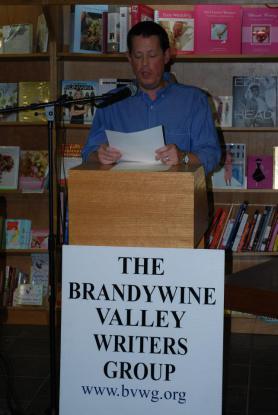
Yours truly at a Brandywine Valley Writers Group public reading in the fall of 2012. Unlike many writers, I like public speaking. Maybe too much. OK, I’ll shut up now.
The topic will be indie and self-publishing and I’ll be one of three writers on a panel made up of members of the Brandywine Valley Writers Group, a great bunch of professional, amateur and aspiring writers based in West Chester, Pa.
Joining me on the panel will be fellow authors Jim Breslin and Jorgen Flood, both of whom have gone about their own publishing adventures via independent or self-subsidized means.
Jim is an editor by day, writes short stories and has produced his own anthology titled Elephant, as well as shepherded the excellent Chester County Fiction anthology, featuring a number of friends and fellow BWVG members. Jim is also the founder of the West Chester Story Slam, a monthly storytelling competition that is now so popular he has to sell tickets and has since spread to other areas of Southeastern Pennsylvania.
Jorgen, who hails from Norway (cool accent!), has three titles to his name, non-fiction and historical fiction among them.
One of the reasons I was invited was to discuss the unique structure of Codorus Press, the publishing collective I helped form along with my good friend and former newspaper colleague Wayne Lockwood.
But along with chatting up the many upsides (and occasional downsides) to publishing independently, one of the things I always stress when speaking to groups of writers is this: Whether you’re publishing through traditional means or independently, the fact remains that you can’t just write a book, put it out there, hide at home and hope it sells.
It’s incumbent on every author – no matter how his or her book is published – to get out there. Talk to people about your book. Make connections. Pick up a copy of your book and put it in someone else’s hands and tell them how good it is. Inspire other writers to do just what you have done. I’m constantly hammering away at the same point: Wayne and I are just a couple of guys who had an idea and a manuscript and decided to do something different, and there’s nothing stopping anyone from doing the same thing.
The fact is that being a writer can clearly be divided into two areas. First, there’s the artistic. If you’re a fiction writer, you’re creating something new entirely out of your own imagination. If you’re writing non-fiction, you are using your journalistic talents or your own experiences to convey to the reader a truth or your own observations and experiences.
Second (and this is the bit that lots of writers like to deny), there’s the commercial. Once the art has been rendered, you must now think of the resulting work as a product that has to be appropriately packaged, marketed and sold. And part of that is being willing to get out there and talk to people. Sure, social networking and PR services will help. Great reviews are wonderful. But I’m convinced that one of the most important parts of being a writer – or any kind of artist – is making that connection with the audience.
I will admit that I have a slight advantage in that I’m a naturally gregarious person who is comfortable speaking to groups. But not every public appearance you make needs to rank up there with other great moments in public speaking. The key is to make yourself available, be friendly, respectful and willing to engage. Most of all, be appreciative that anyone has shown up at all, and those who are there want to hear what you have to say.


March 18, 2013
Grokking Expatriates In Sci-Fi*
 Reblogged from Doin' Time On The Donau:
Reblogged from Doin' Time On The Donau:







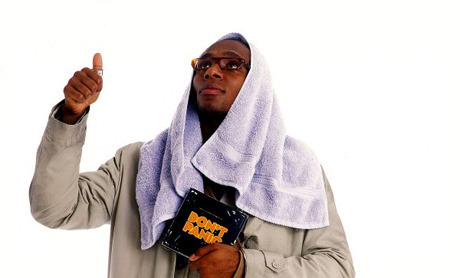

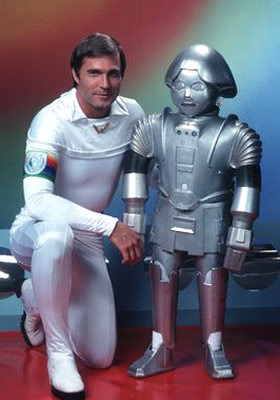





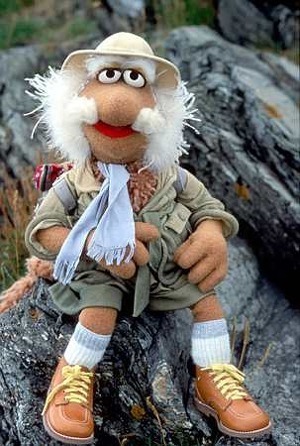
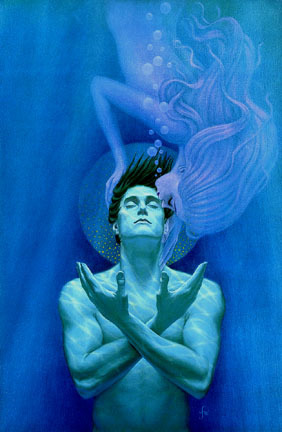
I was having a conversation with Spring about Doctor Who, as we often do, and it occurred to me that The Doctor is actually an expatriate.
That's really what this blog is about- I started to write here originally just to tell my family and close friends what I was up to during my time in Germany. Over time, however, my blog evolved into more than that- I talk about life as an expat, and I talk about things that are different from life back in the US, different from the life I knew before last year.
And on the topic of H2G2, here's a nice piece about expatriates in science fiction and fantasy.
An Early ‘Guide’
Last week marked what would have been the late Douglas Adams‘ 61st birthday, and I should take this (belated) opportunity to thank him for proving to me that although writing is a serious business, it doesn’t have to be entirely serious.

The original, having passed through many hands, as evidenced by the vigorously taped spine.
As a kid, I’d always been a fan of the absurd. I glommed onto Monty Python and Benny Hill early and shared many long BBC-via-public TV blocs of Fawlty Towers with my dad, mostly to the consternation of my mom, who never quite got what the appeal was.
But when I discovered The Hitchhiker’s Guide to the Galaxy, I quite literally fell in love. Since my original edition (shown here – the cover held together by Scotch tape) notes that it is the fifth printing of the Pocket Books first edition with a publication date of 1981, I suspect that I stumbled across what would prove to be one of the defining books of my youth when I was in 7th grade.
As American readers go – at least for my age group – I always felt that I was a bit of an early adopter when it came to H2G2, as it is now fondly known. Many of my classmates were clueless, unaware that such a perfect melding of sci-fi, satire, social commentary and outright hilarity even existed.

Ford Prefect, Arthur Dent and Zaphod Beeblebrox from the 2005 film version of H2G2. Or, me and pretty much any two of my friends after an evening of festivity.
I recall reading and re-reading my copy (thus the tape), then becoming something of an evangelist for the novel, loaning it out to friends who I thought would appreciate it. They, too, became fans, and joined what, for me, was like a special little club of in jokes and cultural exclusivity.
Even today, I sometimes have to restrain myself from foisting it on others – my kids included. Thankfully, my son, at 9, has a growing appreciation based on the 2005 film version. He has my full permission to read the novel whenever he is ready. In fact, he noted to me the other night that his copy of The Dangerous Book for Boys (a must for any adventurous-minded lad) lists H2G2 as a must-read.
This is a good thing, because I can’t even begin to estimate the role H2G2 played on my development as a writer. I can most definitely trace my style of column and opinion writing, first honed at my high school newspaper, right back to the novel. As I grew as a writer and began to read other novelists and columnists, I always found myself drawn to those that maintained a sense of the patently absurd (Dave Barry and the late Lewis Grizzard, I’m talking to you guys).
In fact, I can also trace my eventual discovery of Christopher Moore to my fondness for Adams, and that led me to the legendary West Chester Christopher Moore Codorus Press Ambush, of which I might be convinced to write about some other time.
Nevertheless, if you’ve actually read my novel Immaculate Deception, and you also happened to have read H2G2, I wouldn’t be surprised if you saw some similarities. Hopefully they also made you smile.


March 7, 2013
A Contract From Alibi
So, don't ask me how, but I have in my hands (from what I consider a reputable source) a contract from Alibi, which is the sibling imprint of Hydra, the Random House imprint that I thumped on roundly in the previous entry. You will recall that I thumped on Hydra because its contractual terms were so heinous to authors (including, but not limited to, offering no advances).
A great entry from "Redshirts" author John Scalzi on what could possibly be the worst publishing contract ever. Most surprisingly, it's not from a sneaky vanity press, but a division of Random House. Remember, kids, when offered the option of paying some of your own expenses as an indie publisher and keeping all the profits OR paying your own expenses, giving up all rights, getting no advance and just generally being screwed with, please take Option A.
February 27, 2013
Black and White and Read All Over
Writers can come from any number of backgrounds – just go down the list of famous authors and you’ll see a broad spectrum of “first” careers.
But if you’re a teenager or young adult and you’re serious about wanting to get paid to write every single day, I have two suggestions for you.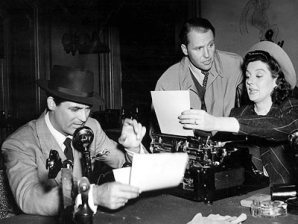
The first is to write a brilliant bit of fiction or a staggeringly wonderful bit of non-fiction before you are 21, then get a multi-book deal with a big New York publisher and ride that gravy train for the rest of your life.
The second and more realistic suggestion is this: go into journalism.
Why? Well, first, the world needs more journalists. It needs people committed to rooting out truth and telling great stories and doing something other than gushing over celebrity gossip and ranting, twitchy-eyed, about their given partisan political perspective. It needs folks willing to toil in relative anonymity to hold the powerful accountable and tell the stories of the ignored and disaffected.
Second, you will gain the skills that every good writer of fiction or non-fiction books must develop, and you will acquire them early. You will learn to write with speed and clarity, get to the point quickly, interview strangers, go into uncomfortable and unfamiliar situations, observe the world around you and do sneaky things like read upside down and eavesdrop on the folks in the restaurant booth behind you while simultaneously holding a meaningful conversation with the person across from you.
You’ll also learn to take criticism without taking it personally. Of all the lessons you could learn early, this is probably the best, as it enables you to accept a comment like, “This need a lot of work,” without collapsing into a heap of self-doubt and whiny pleas about the writing coming from your soul.
Trust me. The value of each of these skills, for any writer, can not be overestimated.
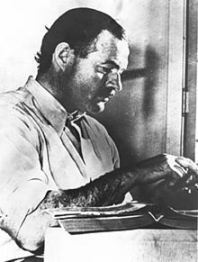 Third, you will join a line of great writers who made the transition from journalism to writing fiction, depending on many of the skills they learned as reporters to make their writing special. Mark Twain started in newspapers and pulled the things he experienced and wrote about into his fiction. Ernest Hemingway started his working life at the Kansas City Star and used the lessons he learned there to inform his writing from then on.
Third, you will join a line of great writers who made the transition from journalism to writing fiction, depending on many of the skills they learned as reporters to make their writing special. Mark Twain started in newspapers and pulled the things he experienced and wrote about into his fiction. Ernest Hemingway started his working life at the Kansas City Star and used the lessons he learned there to inform his writing from then on.
J-school is the writerly equivalent of joining the U.S. Marines. You might arrive thinking you are one badass 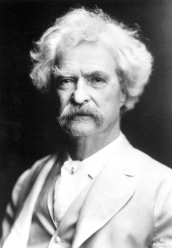 mofo of a writer. Your high school English teacher gushed over your work. Your parents fawned over your awards and teacher’s-pet status. In high school, you might have thought your writing was the absolute shit.
mofo of a writer. Your high school English teacher gushed over your work. Your parents fawned over your awards and teacher’s-pet status. In high school, you might have thought your writing was the absolute shit.
A good journalism school does exactly what Parris Island does for young recruits – it strips you down of all your self-delusions and preconceptions to the very kernel of what you know and who you are, then builds you back up the way you’re supposed to be to do the job at hand.
The Marines specialize in turning tuner-driving, subwoofer-blasting high school douchebags into honorable, unstoppable fighters by breaking them through mental, physical and moral trials, then putting them back together the way the Marines want them – fearless, razor sharp and hard as nails.
A great J-school takes your flowery and overwrought high school prose and says, “You might think you’re awesome. You are not, but we’ll make you that way.” It will strip you so bare of your writing preconceptions that you’ll wonder if you could ever really write at all. Your professors will then start adding basic skills – simple interviewing, the inverted pyramid style, headline writing and copy editing. Only when you have mastered those skills will you be allowed to go down the flowery path again to become the writer that you were truly meant to be.
Sure, I’m biased. I graduated from the excellent journalism school at the University of South Carolina at a time when the faculty was populated with delightful, curmudgeonly newspaper veterans – people who remembered copy boys and typewriters and the clackity-clack of the Associated Press wire machine chugging out reams of stories from around the nation and world. They themselves make great stories.
But here’s the best part of going to a real J-school. Unlike your fellow aimless undergrads, with their relatively useless English and history degrees, you will not only get an excellent liberal arts education, but you will be actually learning a trade. Depending on the market, you can graduate and immediately get a job in your field. And what do you know – that field is writing.
Granted, that first job will likely be at a small newspaper in a backwater town. That sounds like a drag – wouldn’t it be much better to work at the New York Times or ABC News, after all? Sure it would, but unless your parents own a paper or sit on the board at Disney, neither is likely to be your first job.
But the benefits of parachuting into East Outer Nowhere are myriad. Depending on the size of the paper, you’ll get to do almost everything. At my second newspaper job, as city reporter at the Camden (S.C.) Chronicle-Independent, it was possible to cover everything from snooze-inducing city council meetings to violent crime, business ribbon cuttings to interviews with visiting celebrities and political bigwigs, .
I got invited to pilot a glider plane, fly with the Army Golden Knights skydiving team, rappel from a fire department bucket truck and qualify on .38, .45 and Glock 9mm handguns with the police department. On a weekly basis I hung out with cops without being a suspect, visited the jail without being a prisoner and got to see the inner workings of local and state politics without the mess of running for election.
Will you get rich? Unlikely. But you will learn to live within your meager means – a must for any writer, no matter how successful you might become. And until you write that breakout novel that’s bubbling up inside you, you’ll get the daily satisfaction of knowing that you are being paid every day to hone the craft you aspired to.


February 19, 2013
Feel the Music
Music, much like smell, is a powerful memory trigger. Just as a whiff of a lover’s old cologne or perfume can ignite an encyclopedia of emotions, music carries with it the ability to draw a person back to a particular time, place or emotional state.
Personally, I think everyone has a time during their life when they’re especially susceptible to an imprint tied to music. And because an important key in being an effective writer is being able to tap into real emotions, music can be a tool for that.
For me, one of the first moments I recall music directly tied to emotion was as a pre-teen in the late 1970s. Disco was at its height and somewhere out of my field of vision punk was percolating in New York City and London.
But because I was living in a small town near the coast of South Carolina, my exposure to anything other than what was on the local Top 40 AM station was pretty limited. Consider that the first time I heard the Beatles was around that time period when a friend hoped to cure me of my ABBA fandom with a copy of Revolver. Thankfully it worked.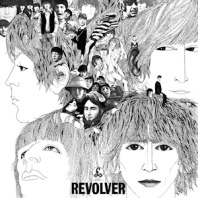
Still, a few bits of excellence filtered through on the airwaves. And while I, at that age, could have already told you that Rod Stewart’s “Do You Think I’m Sexy?” was an abomination, I was able to pick out some gems that really stuck with me. Part of that is directly related to the fact that I was feeling the first pangs of late-grade school infatuation with members of the opposite sex.
So it should come as no surprise that a couple of standout songs from that period were “Is She Really Going 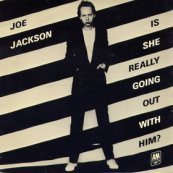 Out With Him” by Joe Jackson and “Cruel to be Kind” by Nick Lowe. Both spoke volumes to what I felt was a cargo ship full of unrequited love I was going through at the time. Now, when I need to tap youthful heartbreak, it helps to cast my mind back to how those particular songs seemed to capture everything my much less cynical younger self felt.
Out With Him” by Joe Jackson and “Cruel to be Kind” by Nick Lowe. Both spoke volumes to what I felt was a cargo ship full of unrequited love I was going through at the time. Now, when I need to tap youthful heartbreak, it helps to cast my mind back to how those particular songs seemed to capture everything my much less cynical younger self felt.
Much like a Method actor, who uses real-life experience to tap into what emotions a character in a film or on stage might be feeling, as writers we are called to do the same things with our stories. Think about the songs during your life that have coincided with highly emotional events or have somehow captured the way you’ve felt about a person or situation and don’t be afraid to use them (and the feelings they recall) in creating genuine, rich and layered emotions for your characters.


February 1, 2013
The Power of the F-You Factor
It’s all well and good for authors to talk about deciding to pursue writing for the sake of art.
But today it’s time to talk about a secret reason many do it, and a possible motivating factor for you to do it, as well.
It’s called revenge. Or as I like to refer to it in terms of writing, the F-You Factor.
Consider this: Many writers, no matter how early they begin, are told either point-blank or through inference that pursuing a career in writing is for losers/social outcasts/people resigned to being broke.
Somehow, the fact that you have stories in your head that you simply must get out is treated like a passing fancy, pointless daydreaming or – worst of all – mental illness.
You’ll often see this kind of treatment early, usually by playful dismissal from parents who haven’t a damn clue what they’re doing. Remember, folks, the idea is to lift your kids up and let them reach their full potential, not to be a soul crushing demotivator because your kid decides she doesn’t want to be a radiologist.
“Ha, ha. You make up such cute stories, Ricky. Too bad that’s just going to get your ass kicked at the country club and ensure no one will ever let you into Harvard.”
Later in life, such comments will come from people like teachers and guidance counselors who are really bad at their jobs – again, demotivating rather than motivating – who say, “Yes, that’s all well and good. But no one can ever make a living being a writer.”
Assuming you make it out of high school with your aspirations intact, you are indeed going to have to make a living. And for lots of people, that living relates to writing not one bit. Everyone has to eat and pay rent, right? But mention your writing aspirations to co-workers and you might get sneers and snickers as they go about their meaningless existences slaving for the evil corporate overlord, with only complete viewings of every season of “The Bacholorette” to show for their pathetic, meaningless lives.
For some this might be the final straw, killing the spirit of potential writers, binding them up like bowels after a big French cheese course and forcing them to never pick up a pen or sit down at a keyboard again, unless it’s to prepare the dreaded TPS reports for the passive-aggressive boss they secret wish they could see sodomized with a garden trowel, partially eaten by maggots, then dumped into pit of molten lava.
But out of all the things listed here, there is NOT ONE that should ever stop you from writing if you feel driven to do so.
In fact, all the above situations should result in you being a better writer – or at least a more motivated writer – because you’ve got plenty of reason to want to prove every single one of those people wrong. You’ve got to want to put your words to paper and have their very presence there shout a resounding “F-You!” to all those people who told you, “You can’t.”
A confession: My wife loves the singing competition The Voice. And because I love her and like being around her, I often watched it with her this past season. There, 18-year-old contestant Trevin Hunte confessed that his prime motivation for auditioning for the show was to prove wrong the teacher who told him he’d never succeed. And when he sang, he sounded like this:
That, my friends, is a prime example of the F-You Factor at work. He could have ended up working in a McDonald’s or an insurance office or any of the other places we all end up having to work, so consumed by his rage - by a debilitating case of the woulda-coulda-shouldas – that it ate him away at the insides, affected every relationship in his life and drove him to an early grave.
Instead, he got out there on national TV to show the world – and that unsupportive teacher – that he would at least give it a try. And to tell that single doubter that she couldn’t keep him down.
The missing piece to someone getting writing accomplished isn’t actually believing they can do it – most aspiring authors have no problem with that – it’s not giving in to all the people around them who say they can’t do it that causes trouble.
So what if no one has ever told you that writing was a sucker’s game? What if you got along great with your parents, they’ve always been supportive and your teachers nurtured and fostered your artistic ambitions?
Well, chances are there’s still someone who’s done you wrong. Class bully make your junior high years a living hell? F-You! Have him eaten by a car, Christine-style, in your latest horror story. Girlfriend or ex-wife ditch you for someone with a cooler car or bigger paycheck (or other attributes)? F-You! She gets to be the first victim of the serial killer in your detective thriller. Those co-workers who sneer? F-You! They’re the troop of zombies your hero defeats by luring them into an industrial furnace.
It’s a stereotype that the best writers come from the most painful backgrounds. I would never say this was true, because everyone that goes through a harsh life doesn’t become a great artist. What an artist does is takes that pain – and joy and ambivalence – that we all feel and translates and distills it for consumption by the masses.
As an author, you’re turning against what most people do, which is keep feelings deep inside hoping they’ll go away, or turning to expensive therapy where someone is paid to listen to them air their grievances. Instead, you get to take that anger, that hurt, that pain of unrequited love and use it to fuel your creative engine, drive you towards greater things and give your work the depth that comes from real, honest emotion.
So if you’ve been told you’re not good enough, or just need a little extra oomph to get that honest writing flowing, be like Cee Lo, and embrace the power of the F-You Factor.


In an Alternate Universe …
… I’d have lived in the glory days of pulp sci-fi magazines, and the serialized version of Immaculate Deception might have started out something like this:
If you’re interested in having some similar fun, check out the Pulp-O-Mizer at Thrilling Tales.





